African Librarians have a stake in ensuring Universal Access to Information
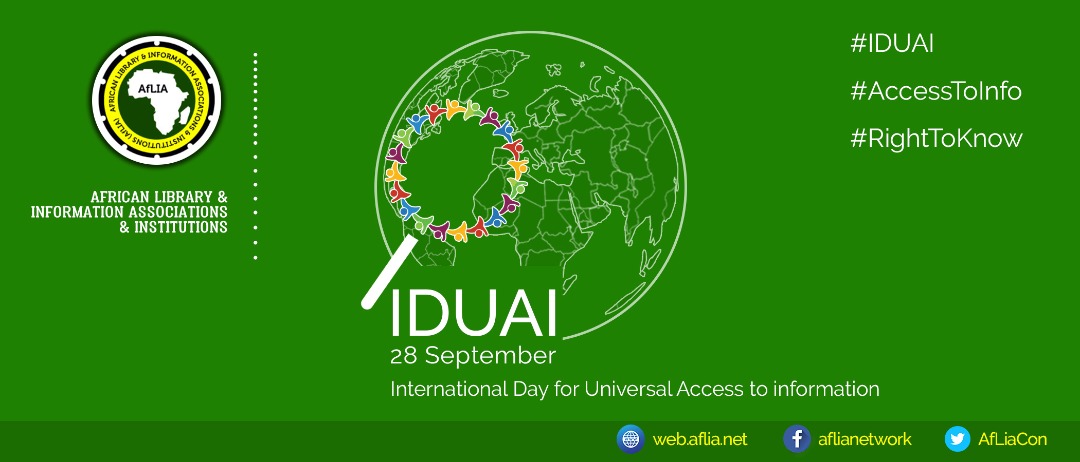
Today, 28 September, 2019, marks the fourth commemoration of the International Day Universal Access to Information since the United Nations Educational, Scientific and Cultural Organization – UNESCO – since the adoption of the 38 C/Resolution 57 declaring 28 September of every year as International Day for Universal Access to Information (IDUAI).
“The theme of this year’s celebration is “Leaving No One Behind!”, a mission in which digital technology is an invaluable resource. However, the unprecedented digital transformation of our era is also leading to new forms of inequality. To combat this, digital innovation must go hand in hand with the obligation of Member States to adopt and improve legislation for public access to information. Through implementing laws, investing in relevant infrastructure, and engaging civil society and young people in particular, access to information can protect human rights and drive sustainable development.”
— Audrey Azoulay, Director General, Message on the occasion of the International Day for Universal Access to Information.
The Day is being celebrated with series of activities across the globe and AfLIA, the trusted voice for the African Library and Information community is not left out. We caught up with some Council members to share their thoughts on International Day for Universal Access to Information, particularly the significance of this year’s theme “Leaving No One Behind” and what role African libraries and relevant stakeholders can play in ensuring access to information for all. Here is what they had to say;
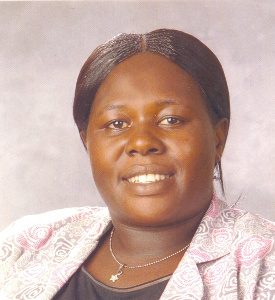
Dr. Sarah Kaddu, East Africa Representative, AfLIA
Question: How can libraries of all types bridge the digital gap for the have and have-nots in Africa so that no one is left behind?
Response: “Libraries should provide the needed /required in information/content to all types of people without discrimination, through various formats, media and in language most suitable to the consumers.”
Question: Internet has increased possibilities of accessing information. What role can libraries play in ensuring safe and equitable access to information online?
Response: “There is a need for libraries to reskill and acquire the competencies in evaluating the online content before it can be used, shared and or reused by the consumers.”
Question: Access to information is the sustenance of democracy. How can libraries leverage on this to sustain democracy in their countries starting from the community level?
Response: “Librarians need to raise awareness to the community so that they can appreciate the value of information and its role to communities.”
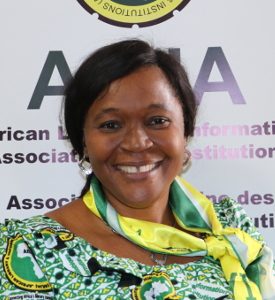
Dr. Chinwe Anunobi, West Africa Representative, AfLIA
Question: How can libraries of all types bridge the digital gap for the have and have-nots in Africa so that no one is left behind?
Response: “Ensure inclusion. How? AfLIA members need to have the determination and commitment to make the difference. Prepare relevant statistical information to convincingly justify advocacy and enhance our lobbying activities to attract partnerships. Librarians also need to engage policy makers in the region.”
Question: Internet has increased possibilities of accessing information. What role can libraries play in ensuring safe and equitable access to information online?
Response: “We need to plan for rejigging of our services. Librarians also need to convince funding bodies that a library is a social service which must be provided and freely, including internet services. Also there must be strategic national and regional advocacy using National Associations and AfLIA to discuss on the approach to ensure deepening access and use of internet.”
Question: Access to information is the sustenance of democracy. How can libraries leverage on this to sustain democracy in their countries starting from the community level?
Response: “Librarians must understand the mission and vision of their parent bodies and develop programs that will also imply engendering democracy while maintaining the mandate etc.”
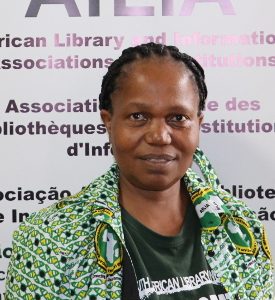
Nthabiseng Kotskoane, IFLA Africa Chairperson (co-opted)
Not my words but the words of the two authors below sum up issues with digital gap in Africa.
UNESCO’s Director-General, Audrey Azoulay says, “today, the main factor preventing people in developing countries from using mobile internet is not affordability but poor literacy and digital skills. Gender inequality in digital technology is even more alarming. Women are less likely to have internet access than men, and this gap is widening”.
As AfLIA and Librarians in the continent is our duty to teach digital literacy skills. Libraries are closer to the community and we are well positioned to offer training and empower our communities. This can be done in the language that the community understands.
“It is about understanding the needs of people in terms of connectivity, literacy, access to content in different formats and languages, and services. It is about bringing the costs of services and devices down. And it is about empowering people who lack standard basic ICT skills with the means to participate in the digital ecosystem” says Paula Ingabire, Minister of ICT and Innovation for the Republic of Rwanda.”
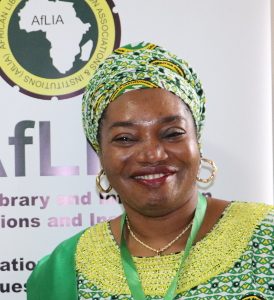
Mrs. Neemat Abdulrahim, Chair, Public & Community Libraries, AfLIA
Question: How can libraries of all types bridge the digital gap for the have and have-nots in Africa so that no one is left behind?
Response: “The best way of bridging the digital gap between the have and the have-not in Africa is for the Public and community libraries to solicit support from certain individuals and local enterprises in their respective communities, in enabling provision of free and secured internet access to the public.”
Question: Internet has increased possibilities of accessing information. What role can libraries play in ensuring safe and equitable access to information online?
Response: “Public and community libraries play an important role in people’s lives as a source of accessing information and a place for knowledge creation. It has shown that public libraries are important informational, educational, cultural, and social institutions. One of the public library’s‘ significance and fundamental roles is education. Librarians can ensure access to safe and equitable access to information by providing all patrons with free public use of computers, as well as I.T training, especially on ways and how to distinguish between safe and unsafe websites, and educating them against online predators. Also, we need to teach our patrons how to use filtering and anti-virus softwares to control contents and information they surf on the internet.”
Question: Access to information is the sustenance of democracy. How can libraries leverage on this to sustain democracy in their countries starting from the community level?
Response: “Public and Community Libraries close the gap between the have and have-not as safe, trusted spaces for all without discrimination. Creating innovative programs, such as “Collaborative Spaces”, that can promote diversity and improve social interactions among the members of the community is key. Creating a corner that will be responsible for public enlightenment on the democratic process. The same avenue can be used to disseminate government and other civil programmes to the community.”
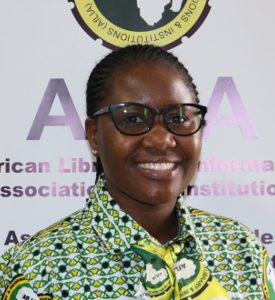
Elizabeth Matheus, Southern Africa Representative, AfLIA
Question: How can libraries of all types bridge the digital gap for the have and have-nots in Africa so that no one is left behind?
Response: “Digital divide is the gap [gulf] between communities who have access and make effective use of information technology and those who cannot. Libraries are one of the major community tools which can solve the digital divide through access to information and contribute to the realization of the “no one should be left behind” concept. Libraries play a vital role in bridging the digital divide by providing access to computers and the internet to those who do not have such facilities. The perception that access to digital information is only for the elites, is and continues to be eradicated by libraries being equalizers and democratic forces in access
to information, computers and internet; leaving no one behind”.
Question: Internet has increased possibilities of accessing information. What role can libraries play in ensuring safe and equitable access to information online?
Response: “As gateways to information and knowledge, libraries play a fundamental role in society especially in today’s world where internet is filled with fake news. They provide authentic, up to date, relevant and needed information resources, creating opportunities for the citizens to learn and relearn and redirecting themselves and at the same time supporting literacy and educating and helping citizens to have access to the right information at any given time.”
Question: Access to information is the sustenance of democracy. How can libraries leverage on this to sustain democracy in their countries starting from the community level?
Response: “Libraries are central to the quality of life in any given society; they have direct roles in preserving democracy and its attached freedoms. This is because people who have access to the right information and understand how to make use of the acquired information in exercise of their economic, political, and legal rights are empowered, and in turn enabling them to build a solid democratic society. Democracy cannot be put in place unless an informed and well-educated populace is assured through library services, especially when it supports indigenous efforts to learning and change. Libraries have to be adequately prepared and ready to supply materials and services that would educate its citizens in holding their leaders accountable.”
Indeed library professionals across the continent, along with Governments and relevant bodies, have a stake in ensuring Universal Access to Information given its overarching implications on viable democracies, equal societies, sustainable development, protection of human rights as well as education and literacy. How about you? What do you think? Share your thoughts with us!!
Want to read more exciting stories and articles on African Library Vibes? Please click here: AFRICAN LIBRARY VIBES.
Want to learn how to contribute an interesting story or article to African Library Vibes? CLICK HERE TO CHECK OUT HOW TO DO SO.
